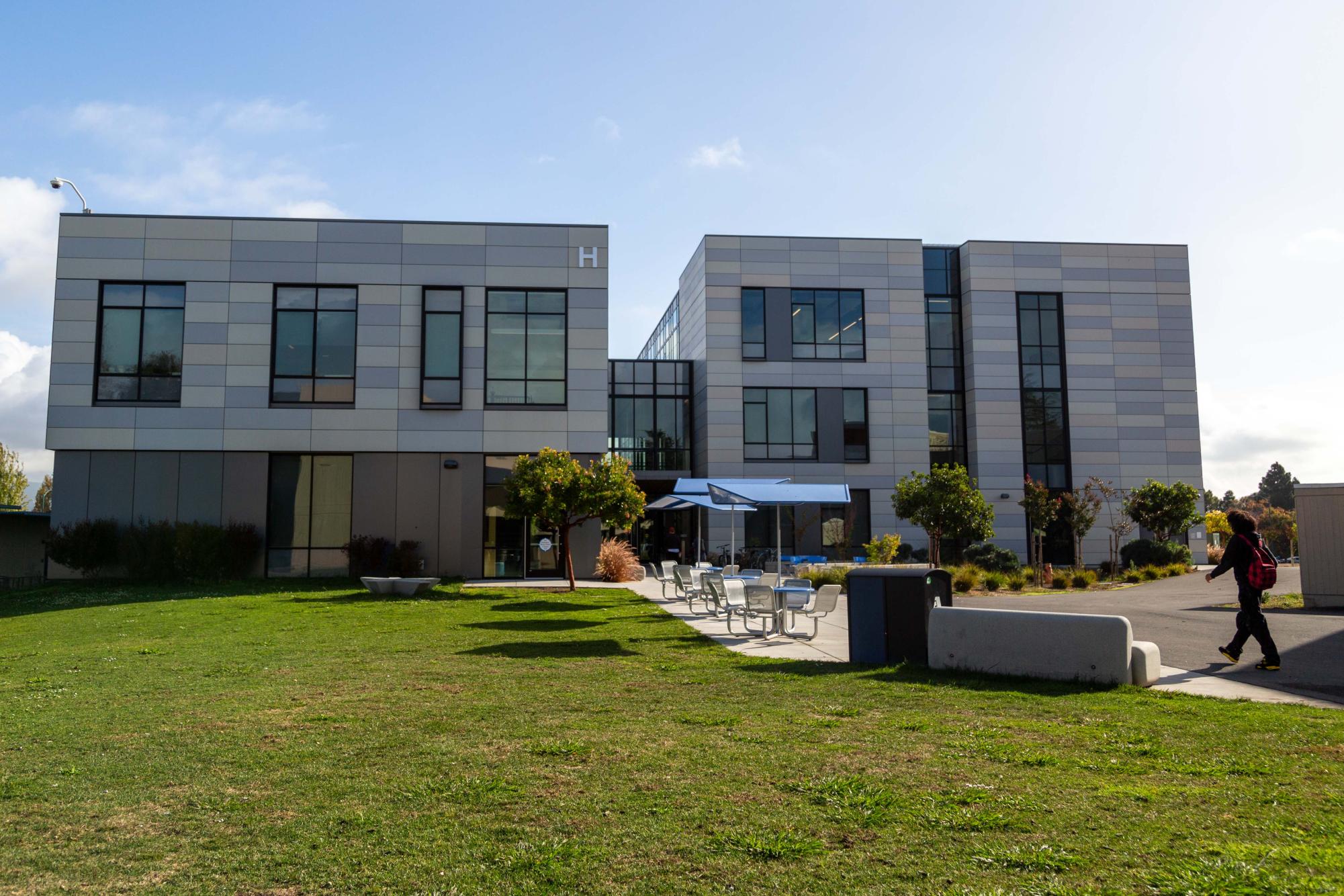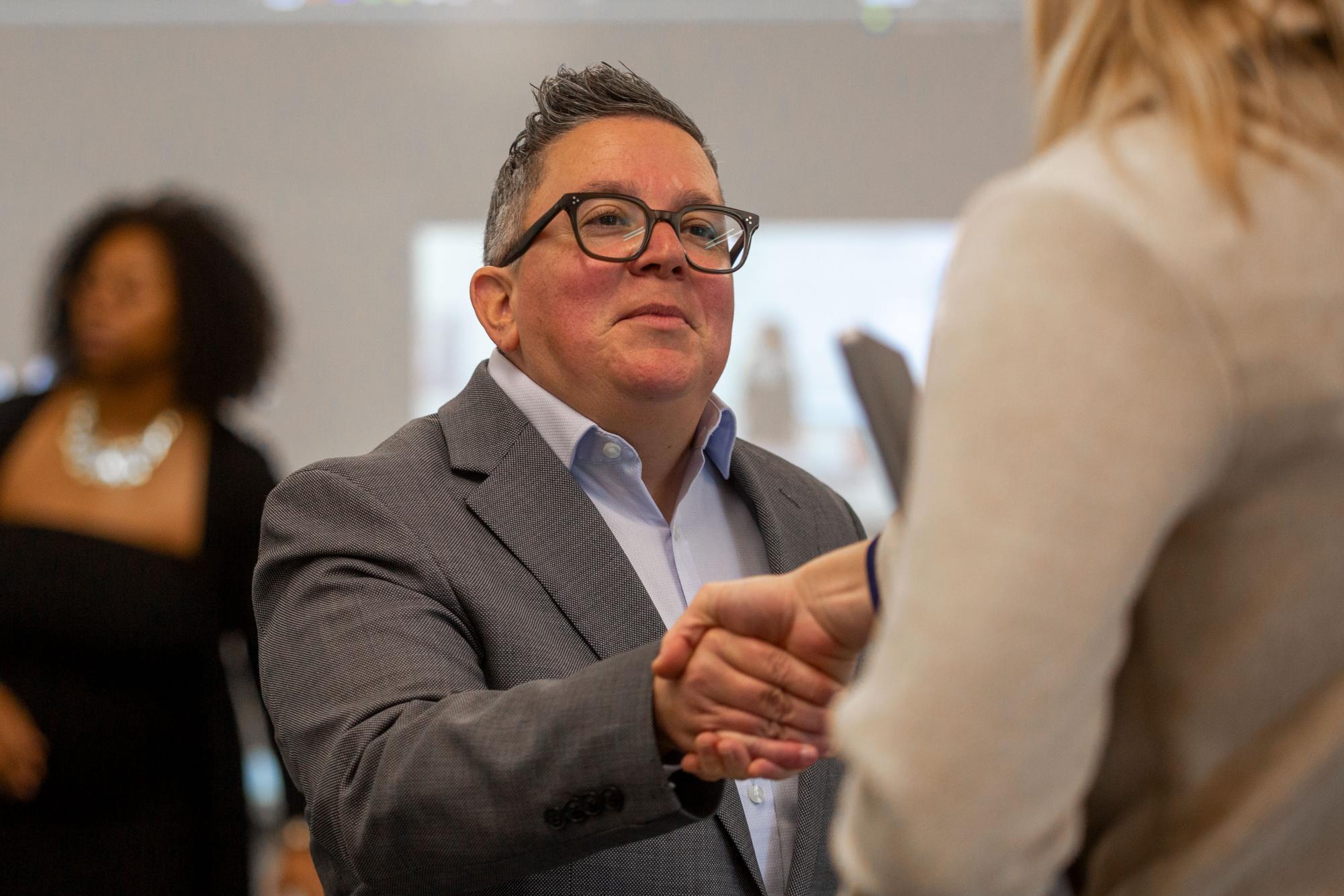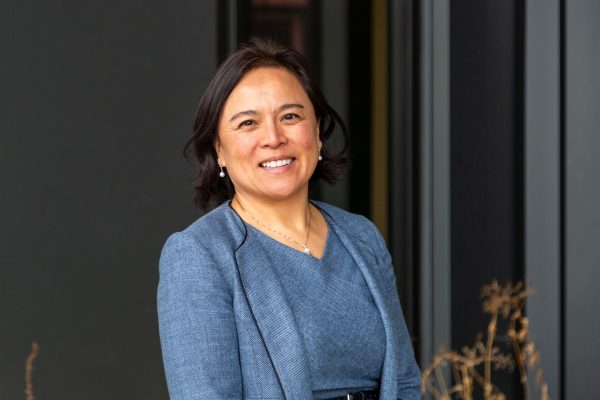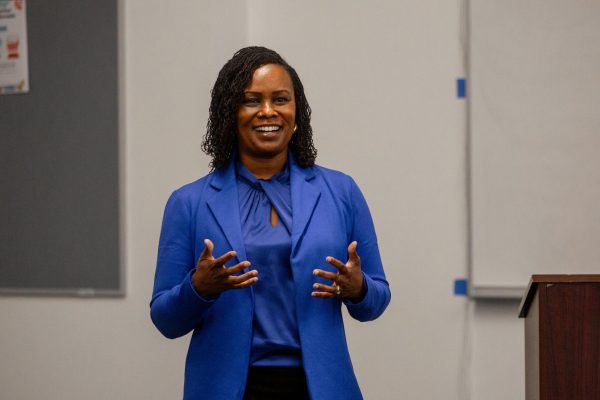
Three candidates for the College of Alameda (CoA) Vice President of Instruction answered questions and introduced themselves at public forums held Nov. 14.
The candidates are: Carol Hernandez, Dean of Math, Sciences and Business at the College of Marin; Loretta Silverman, Dean of the Science, Technology, Engineering, and Mathematics Division at Ohlone College; and Nicole Porter, Interim Vice President of Student Services and Equity at American River College.
The selected candidate will be tasked with overseeing the college’s instructional programming and managing faculty tenure review processes. They may also serve as “Administrator in Charge” in the absence of the president.
The role was previously permanently held by Diana Bajrami, who abruptly stepped down and returned to faculty in March.
The college, one of four colleges in the Peralta Community College District, is struggling with budgetary challenges brought on by low enrollment and aging facilities.

Carol Hernandez serves as Dean of Math, Sciences and Business at the College of Marin and holds a Doctorate of Educational Leadership from Mills College.
Hernandez introduced herself as a first-generation Hispanic American and member of the LGBTQ community whose family emigrated from Spain to escape the Francoist dictatorship. She recalled her mother graduating from a community college in West Memphis, Arkansas.
“My mother didn’t have a lot of education, and she was always a little bit self-conscious,” Hernandez said. “A lot of people looked down on her because of the way she talked. And so going to community college was a real transformation for her.”
Hernandez related the experience as pivotal in her life, and why she has a history of fundraising for community college programming that benefits low-income and underserved students.
Talking about possible strategies to ensure that CoA’s academic programs align with workforce needs, local community needs and transfer pathways, Hernandez pointed to gatherings her college has had with local K-12 school administrators and community partners.
“It also […] a way to market ourselves as the leaders in the community,” Hernandez said.
As an example of her ability to take the initiative and affect change, Hernandez referred to her experience leading the effort to raise funds for the MESA program. Since the program’s establishment at Los Medanos College, enrollment in physics, chemistry and biology classes has increased by about 20%, Hernandez said.
“It’s become a vibrant part of our community,” Hernandez said.
She said she would use her mathematical expertise and her preference for collaboration to reverse reductions in enrollment.
“We can do that through student surveys, focus groups to ensure that our marginalized populations, our voices are also heard, and ask the questions like, why are students taking fewer classes?” Hernandez said.
When dealing with faculty disciplinary issues, Hernandez related an instance when she had a difficult case involving a faculty member which her team resolved by providing professional development in the form of books, literature and counseling over a couple months culminating in a report by the faculty member.
“That actually was one of the most transforming things for this individual because they were able to really take a deep dive into how their behavior was having an impact on the students,” she said.
Asked how she would implement budget cuts while maintaining high quality programs, and what criteria she would use to determine resource allocation, Hernandez stressed the need to focus on increasing enrollment.
She suggested a number of strategies for engaging high school students, such as focusing on dual enrollment and embedding counselors in high schools, so that, “when their students are thinking about college, College of Alameda is top of mind.”
Tailoring class schedules to student needs and creating strong community partnerships can also generate enrollment, Hernandez said.

Loretta “Lori” Silverman is Dean of the Science, Technology, Engineering, and Mathematics Division at Ohlone College.
Introducing herself, Silverman related the story of her family’s flight from Vietnam in 1979 as the “worst vacation ever.” Her family eventually settled in Berkeley, CA where she and her mother were taken in by an aunt and lived alongside her 12 family members in a two-bedroom cottage.
Silverman spoke about the change she saw in life after her mother got an associate’s degree from Mills College.
“The story that still brings tears to my eye is actually, I remember the very first dress that my mom got me after she got a job,” Silverman said.
She said the experience was a driver for her.
“I believe in community college because I have seen it in my lifetime, that a change in education and a change in working wage can change family, and I’m a product of that,” Silverman said.
To align the college’s academic programs with workforce needs, Silverman suggested working with government economic development agencies. Ohlone College, for example, worked with the city of Fremont’s economic development director to create a certificate program with Tesla. By the end of the 10-week program, she said, students “are actually working on the floor pretty much the day after their graduation.”
She referenced her work on AB 1705 compliance as evidence of her ability to lead significant change and take initiative. AB 1705, which took effect July 1, 2023, requires community colleges enroll students in transfer-level English and math courses, rather than requiring them to take remedial courses.
“I’m actually in charge of our AB 1705 at Ohlone College,” Silverman said. “English was pretty much set on AB 1705 and I fixed the curriculum and got deactivated a lot of the non-transferable English classes. Math was a little bit farther behind.”
When dealing with faculty disciplinary issues, Silverman said she would “provide all the opportunity to help the faculty to improve, to guide them, to show them what we’re looking for, why we’re looking for it, why are we doing this.”
She also addressed the goal of increasing enrollment, explaining how community college funding will be determined by not just enrollment, but also the number of students receiving financial aid and degrees and programs completed.
“And so making sure that for me, if I’m cutting classes to save some money, I don’t cut classes that’s going to impact a degree,” Silverman said.

Nicole Porter is Interim Vice President of Student Services and Equity at American River College. She spoke of her family of service members.
“My dad was in the army,” Porter said. “My grandfather was in the army. He was a paratrooper. That’s crazy. He dropped out of planes, my stepfather. My husband, who is a Marine, he says, we’re always Marines, right? My son was in the Air Force. […] The way that I got to serve was I chose education.”
Asked about aligning CoA’s academic programing with workforce and local community needs along with transfer pathways, Porter pointed out the need for the VP of Instruction to be present in academic spaces, and promised to meet with faculty, department chairs, classified professionals, and students.
Asked how she’d balance CoA’s obligation to offer a broad range of classes with the business imperative to maximize enrollment, Porter emphasized working with student services and faculty senates to understand what classes are doing well and why.
When dealing with faculty disciplinary issues, Porter stressed the importance of engaging deans to start the process correctly.
“Safety is physical as well as emotional safety,” Porter said. “I need to know students are safe in classes.”
Porter pointed out the importance of belt tightening to help bridge the financial gap at CoA.
“Collectively, how can we come together to save some money on supplies?” Porter said. “Those types of things, right? I might not be able to get you the purple ones, but you can get the basic cut back and get you the primary colors. So we need to have those conversations.”
Porter closed her comments by reflecting on her reason for working in public education.
“I come humbly as a servant leader, and that’s why I love to serve,” she said.


























